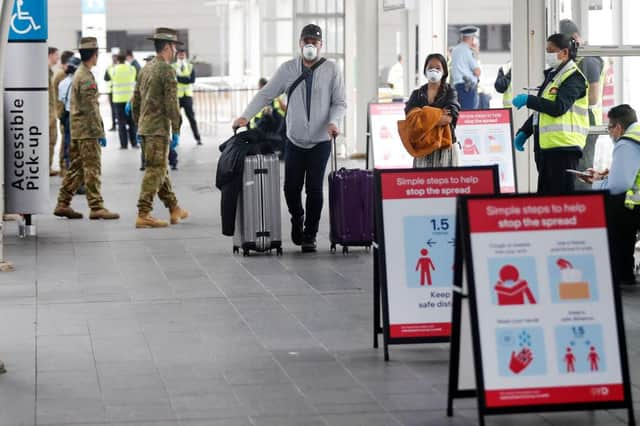Covid hotels: what are the government’s new quarantine hotels - and how much will it cost to self isolate?


As the UK government attempts to curb the spread of new Covid variants from other countries, people arriving in the UK from high-risk places will now be required to self-isolate in a Covid hotel.
Those self-isolating in Covid hotels, which will be contracted by the government, will not be able to leave their room for 10 days, and will be expected to foot the bill for their stays.
Advertisement
Hide AdAdvertisement
Hide AdSo what are Covid hotels and what are the rules? This is what we know so far.
What can passengers arriving into England expect?
Passengers arriving into England from high-risk countries - where coronavirus cases are extremely high or the new strain of the virus is prevalent - will be required to isolate at a designated hotel.
On 25 January, Boris Johnson stated the UK had "one of the tightest regimes in the world" and the government wants to "protect this country from reinfection from abroad" as it seeks to vaccinate all priority groups in the UK.
It has not yet been determined whether the new strains - found in countries such as South Africa and South America - can be vaccinated against using current vaccinations.
Advertisement
Hide AdAdvertisement
Hide AdThose who arrive from high risk destinations will be taken through customs and security in groups, without visiting any communal areas, before being driven to a hotel to begin their isolation period.
Passengers - regardless of whether they are residents of the UK or tourists - will be expected to pay for the charges incurred for their isolation period, with bills expected to be upwards of £1,000 per person.
The charges will be outlined by the prime minister later today (26 January).
The quarantine will last for 10 days, during which time those in quarantine will be required to stay in their rooms, with food provided via a room service system.
Advertisement
Hide AdAdvertisement
Hide AdAll passengers arriving into the UK will still be expected to provide a negative coronavirus test within 72 hours prior to their arrival in the UK.
Those required to isolate at a hotel can be released early if they test negative for the virus after five days self-isolating.
Which countries are considered high risk?
At present, most of South Africa and South America, as well as Portugal have been listed as countries requiring isolation at a hotel upon arrival in the UK.
However, the list could be lengthened, with reports that ministers such as Priti Patel and Matt Hancock hope the quarantine rules will be rolled out to any inbound passenger.
Advertisement
Hide AdAdvertisement
Hide AdBoris Johnson will chair the Covid operations committee tonight (26 January) to further discuss the details of the programme with ministers.
Where are Covid hotels?
The Best Western hotel chain has confirmed it is waiting on the ‘green light’ from the government, so it can begin to support the new travel quarantine programme.
The hotel group has locations across England and Scotland, though it is not yet known which specific hotels will be used as covid quarantine destinations.
Rob Paterson, chief executive of Best Western Hotels, said the decision was a "big blow for tourism,” however with thousands of hotel rooms standing empty, he added: "We understand it's a crisis and we all need to do our bit."
Advertisement
Hide AdAdvertisement
Hide AdHe also explained how residents in the hotels would be given three meals a day and fresh linen and towels, while CCTV would be used to ensure people do not leave the hotel during their isolation period.
Have other countries taken this approach?
In Australia and New Zealand, this approach has proven highly successful.
Arrivals into these countries have been required to isolate at specific hotels for a minimum of 14 days - and up to 24 days if they do not provide two negative coronavirus tests.
In Australia, the cost of staying in a hotel is approximately £1,700 ($3,000) per adult and £2,800 ($5,000) for a family of two adults and two children. Passengers are expected to pay these bills when their quarantine period has ended.
Advertisement
Hide AdAdvertisement
Hide AdThere are exceptions for people who can prove they are unable to pay.
Failing to comply with the quarantine duration is a criminal offence in Australia. The penalty for flouting the rules there are £6,000 ($10,500) for individuals or six months in prison, or both with an additional £3,100 ($5,500) fine for each day you remain out of quarantine.
This approach has seen Australia achieve no new infections for some weeks, while New Zealand had no new cases for three months until one person proved positive in mid-January.
Are all areas of the UK taking the same precautions?
At present, only England has outlined plans to introduce mandatory hotel quarantine.
Advertisement
Hide AdAdvertisement
Hide AdHowever, Nicola Sturgeon will chair a cabinet meeting today (26 January) and will outline the Scottish Government’s approach thereafter.
She has already alluded to a “four nations approach”, adding the approach was already “under active consideration".
The Northern Ireland Executive is also expected to discuss travel rules when it meets on Tuesday.